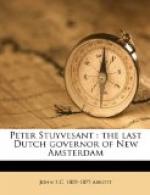“The Commissioners conclude their negotiation by declaring that if you shall offer any injury to any of the English in these parts, whether by yourselves or by the Indians, either upon the national quarrel, or by reason of any differences depending between the United English Colonies and yourselves, that, as the Commissioners will do no wrong, so they may not suffer their countrymen to be oppressed upon any such account.”
The morning after this unfriendly retirement of the agents, Governor Stuyvesant dispatched a messenger to Boston, with a letter containing a very full reply to the grievances of which the New England colonists complained. In this letter, which bears the impress of frankness and honesty, he says,
“What your worships lay unto our charge are false reports and feigned informations. Your honored messengers might, if they had pleased, have informed themselves of the truth of this, and might also have obtained more friendly satisfaction and security, concerning our real intentions, if they had pleased to stay a day or two with us, to have heard and considered further of these articles.”
On their way home, the New England agents stopped at Flushing, Stamford and New Haven, to collect all the evidence they could against Governor Stuyvesant. The hearsay stories of the Indians they carefully picked up. Still the only point ascertained, of any moment was, that Governor Stuyvesant had told an Englishman, one Robert Coe, that if the English attacked him, he should try to get the Indians to come to his aid; and that he had said the same to William Alford.
This was all the evidence the agents could find against the governor. He had made these declarations without any purpose of concealment. He had been instructed to pursue this course by the Amsterdam Directors. The New England colonists had in their Pequod war, set the example of employing Indian allies. This repulsive feature in the British colonial administration continued until the close of the war of the Revolution.
Captain John Underbill, an Englishman, who had obtained considerable renown in the Pequod war becoming dissatisfied with some ecclesiastical censure which he had incurred, petitioned Governor Stuyvesant for permission to reside, with a few other families in New Netherland, under the protection of the Dutch, offering to take the oath of allegiance which was required of all foreigners. His request was promptly granted. It was the liberal policy of the Dutch government not to exclude foreigners from any privileges which the Hollanders themselves enjoyed. Underhill was now residing at Hempstead, Long Island. His restless spirit, ever eager for change, seized upon the present moment as a fitting opportunity to wrest from the Dutch their portion of Long Island, and pass it over to his countrymen. In violation of his oath he issued a treasonable proclamation, in which he said,




